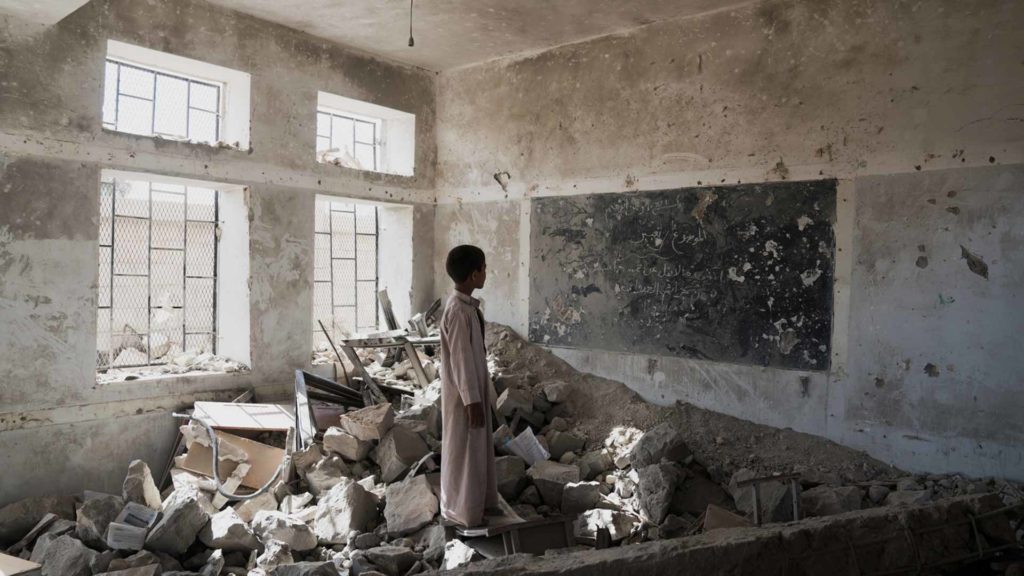GCPEA News
Education suffered over 14,000 armed attacks in last 5 years
Representatives from over 90 countries gather in Palma de Mallorca to build on Safe Schools Declaration
GCPEA PRESS RELEASE, May 26, 2019
(Palma de Mallorca, Spain, May 27, 2019) Over the last five years1, more than 14,000 armed attacks on education took place in 34 conflict-affected countries that suffer these attacks systematically2, new and updated data of the Global Coalition to Protect Education from Attack (GCPEA) found.
Among these incidents were some 10,000 attacks on schools – buildings were bombed, damaged or used by armed forces or groups, sometimes making them inaccessible to students. Nine countries each suffered more than 500 attacks on schools.
GCPEA released the new data on the eve of the fourth anniversary of the Safe Schools Declaration; high-level representatives from over 90 countries will gather in Palma de Mallorca, Spain, on May 28-29, 2019, to mark this anniversary.
They will be joined by leaders from non-governmental and international organizations at the Third International Conference on Safe Schools, to discuss ways to build upon the significant progress that has been made in protecting students, teachers, and academics living in situations of armed conflict, since the Declaration was opened for endorsement in Oslo, Norway, in May, 2015. The Safe Schools Declaration is an inter-governmental political commitment to protect education in armed conflict. The Palma Conference will be hosted by the governments of Spain, Argentina, and Norway, and GCPEA.
“In just four years, 89 States, almost half of all UN Member States, have endorsed the Safe Schools Declaration, and committed to taking concrete action to end targeting of schools and universities, and the killing, maiming, abducting, recruiting, and raping of students and teachers at education institutions and on route to them,” said Diya Nijhowne, GCPEA executive director. ”The Palma Conference is an opportunity to build on this tremendous momentum and encourage all UN members to join the Declaration and ensure that the right to education can become a reality for all.”
By endorsing the Safe Schools Declaration, States commit to improve monitoring and reporting of attacks on education and military use of schools, assist victims of attacks, prosecute perpetrators, and promote measures that enable safe education to continue during war. By joining the Declaration, States also endorse and commit to use the Guidelines for Protecting Schools and Universities from Military Use during Armed Conflict.
The research by GCPEA also found that in at least 30 countries, schools were used for military purposes. Military use of schools or universities makes targets out of the students and educators, and increases the danger or sexual violence and recruitment. It also causes damage to infrastructure and widespread drop out by students and teachers. Often schools are closed entirely, severely diminishing access to education.
Over the last five years, armed groups were reportedly responsible for sexual violence in and around schools or along school routes in at least 17 countries affected by conflict and insecurity, and child recruitment around schools reportedly took place in at least 15 countries.
Over the same research period, female students and teachers have been directly targeted for attack, including through bombings of girls’ schools, and abduction, rape, and harassment by armed parties at school and along school routes, in at least 18 countries facing conflict and insecurity.
Even when they are not specifically targeted because of their gender, the consequences of attacks on education are often different for females. Girls are less likely to return to school due to pregnancy, stigma, and medical problems resulting from rape, as well as parents’ fear of sexual violence in school if they return. Prioritization of boys’ education when resources are limited also restricts girls’ education.
Being out of school for even a short period increases the risk of early marriage, which further diminishes the chances of girls returning to school due to pregnancy, household responsibilities, or husbands forbidding them to return. GCPEA’s research in Nigeria and the Democratic Republic of Congo documents the experiences of women and girls when education is attacked.
During the Palma Conference, participants will share concrete measures they are taking to implement the Declaration and Guidelines. In particular, the Conference will consider how the Safe Schools Declaration can be implemented to incorporate the particular needs of males and females. GCPEA has developed guidance on how this can be done. The Conference will also examine how to enhance monitoring and reporting of attacks on education.
“Education is key to realizing a range of social, political, and economic rights that are essential to building peaceful and stable societies; however, schools and universities have often become the battlefields where wars are waged, with students frequently being the prime casualties,” said Nijhowne. “To safeguard learning in armed conflict, education must itself be protected from attack: the Safe Schools Declaration is a critical tool for ensuring that safe education can continue during war, and the Palma Conference is a key forum for sharing strategies to propel its widespread and effective implementation.”
———-
1 Research period from 2014-2018. The research by GCPEA has found that over the last five years, in total, more than 14,000 attacks on education were reported in the 34 countries in conflict and insecurity that GCPEA found to have faced a systematic pattern of attack on education.
2 A “systematic pattern of attacks on education” is defined as any country where more than 20 attacks on education were reported between 2014 and the end of 2018.





